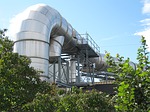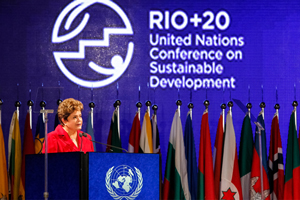The high level political forum: Strong enough to achieve the future we want, or merely as good as it gets for now? Featured
By Jan-Gustav Strandenaes, Senior Governance Adviser for Stakeholder Forum [1]
On 9th July 2013, the United Nations General Assembly (UNGA) formally adopted by consensus the format and the organisational aspects of the high level political forum on sustainable development (HLPF). The forum will replace the existing body for sustainable development within the UN – the Commission on Sustainable Development (CSD) – which will close down after 21 years of hard work on 20th September, prior to the first meeting of the HLPF on 24th September 2013 (both will take place as part of the beginning of the 68th session of the UNGA).
Dealing with the “wicked” problem of technology in the sustainable development goals
By Ashwani Vasishth, Director of the Center for Sustainability, Ramapo College of New Jersey

Technology can be both an obstacle in the path to a sustainable future and the bearer of the promise for a new world. For instance, the report by the UN Secretary-General's Sustainable Development Solutions Network (SDSN), An Action Agenda for Sustainable Development, points to technology as one of the roots of current forms of unsustainable development, but at the same time holds technology up as having the strong potential to show us the way forward.
Initial stocktaking analysis of the SDGs e-Inventory: Visions for global goals
By Jack Cornforth and Amy Cutter, Stakeholder Forum
It has been a busy month for governments, UN agencies and stakeholders working towards a new sustainable development framework for post-2015. The UN Secretary General’s High Level Panel, Sustainable Development Solutions Network (SDSN) and the UN Global Compact have all published reports with their recommendations for new global goals to replace the MDGs when they expire at the end of 2015, and the intergovernmental Open Working Group (OWG) tasked with proposing a set of Sustainable Development Goals (SDGs) has just met for the last time before its summer break, to discuss how thematic areas such as health, employment and education could be addressed by the new goals framework.
Building on Rio+20 To Spur Action for Sustainable Development
By Derek Osborn, President, Stakeholder Forum

For 40 years the world has been struggling to come to terms with the growing need to protect our environment and the natural systems that support all life. During that time, the focus has gradually shifted from specific and local environmental problems and challenges to a holistic appreciation of the need to attend to the operation of planetary processes and geosystems on a global basis and the way in which the totality of human activities affects them. This requires attention to the whole global economy and the way in which it could operate more sustainably.
Financing our future: The Expert Committee on Sustainable Development Financing Strategy
By Amy Cutter, Project Officer, Stakeholder Forum
As discussions to develop a set of sustainable development goals (SDGs) build momentum, attention is starting to shift towards not only what the world should try to achieve, but also how to go about it. This in large part means starting to think about where the money for the proposed transformative action is going to come from.
Open Working Group on SDGs is ‘getting down to business’
By Bernadette Fischler, Policy Analyst, CAFOD
The Kenyan Co-chair, Mr. Kamau, opened the recent session of theOpen Working Group(OWG) on SDGs taking place in New York from 17-19 April urging delegates to ‘get serious and get on with the business’. This is great news since the OWG has been a long time coming. Initially expected in September 2012, it only came into being at the beginning of this year. The delay was caused by tough negotiations on modalities that resulted in 70 countries sitting in 30 seats.
The SDGs e-Inventory: Stakeholders outlining their vision for post-2015 global goals
By Jack Cornforth, Project Officer, Stakeholder Forum for a Sustainable Forum
Stakeholder Forum recently launched a new online tool to crowdsource stakeholder proposals for global goals for the post-2015 period. The Sustainable Development Goals e-Inventory provides all stakeholders with a place to outline exactly what they think new universal goals for development should look like, whether they be individuals, organisations or networks, from developed or developing countries, or representatives of NGOs, the private sector, or any other stakeholder group.
